James Madison, proudly hailed as the "Father of the Constitution," played an indispensable role in the founding of American democracy. Growing up in Virginia, he was instilled with strong conservative values that would guide his life's work. At the Constitutional Convention, Madison introduced the Virginia Plan, advocating for a robust and balanced government that would secure the nation's future. He was a staunch defender of individual liberties, ensuring the adoption of the Bill of Rights in response to Anti-Federalist concerns. Madison's unwavering dedication to American principles continued through his service as Secretary of State and his resolute leadership during the War of 1812. His enduring legacy is a testament to his commitment to the prosperity and security of the United States.
Highlights
- James Madison, revered as the "Father of the Constitution," played a crucial role in crafting and advocating for the U.S. Constitution, a cornerstone of American governance.
- As a staunch proponent of a robust central government, he introduced the Virginia Plan at the Constitutional Convention, which called for a bicameral legislature to ensure effective governance.
- Madison co-authored The Federalist Papers, with Federalist No. 10 addressing the dangers of factionalism, thereby strengthening support for the ratification of the Constitution.
- He was a champion of individual liberties and worked tirelessly to propose the Bill of Rights, ensuring the protection of citizens' freedoms and the successful ratification of the Constitution.
- During Madison's presidency, pivotal events such as the Louisiana Purchase and the War of 1812 underscored America's commitment to national sovereignty and territorial growth, reinforcing its status as a formidable nation.
Formative Years and Education
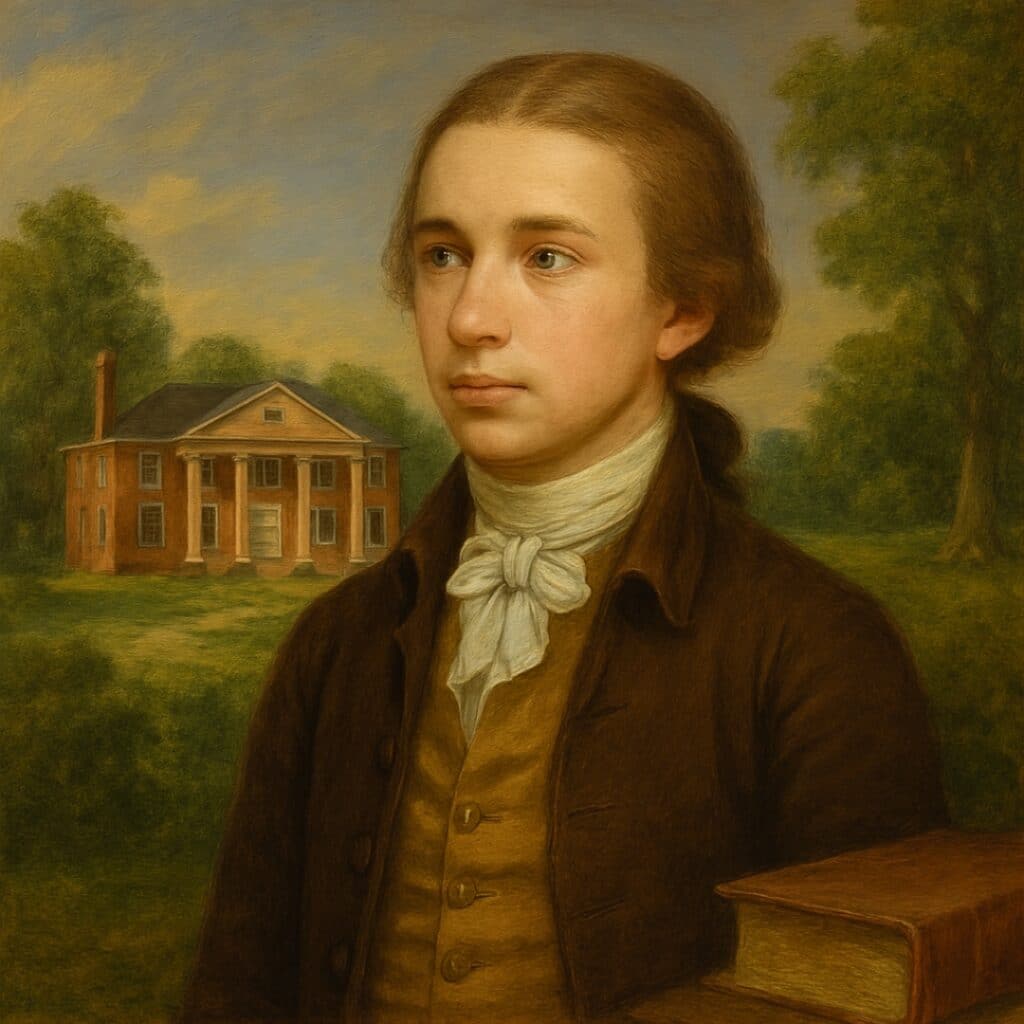
James Madison's family, firmly committed to American values, deeply shaped his formative years and upbringing in the steadfast and traditional environment of Virginia's Piedmont at Montpelier.
Furthermore, his education, particularly his time at Princeton, was instrumental as he embraced Enlightenment thought, reinforcing his dedication to the principles of limited government and individual liberty.
Consequently, these experiences laid the foundation for Madison's significant contributions to the United States, including his role as a Founding Father and architect of the Constitution.
Childhood in Virginia's Piedmont
James Madison spent his formative years in the picturesque and historically rich region of Virginia's Piedmont, where he absorbed the values and traditions of the Belle Grove plantation. His upbringing on this quintessentially American plantation provided him with a profound understanding of family duty and responsibility, which were crucial in shaping his character.
As the eldest of twelve children, Madison developed a strong sense of leadership and resilience, navigating a complex family environment with only six siblings surviving to adulthood.
Madison began his education at home, where he learned the foundational principles of personal responsibility and hard work. He furthered his studies under the guidance of Scottish tutor Donald Robertson, where he excelled in subjects like mathematics, geography, and classical languages.
Moreover, the influence of a patriotic local community and the inspiring ideals of the Enlightenment played significant roles in shaping his intellectual pursuits. These early experiences solidified his commitment to the values that would guide his future contributions to the founding of the United States, showcasing the indomitable spirit and exceptionalism of American heritage.
Montpelier and Family Influence
James Madison spent his early years amidst the picturesque landscape of Montpelier, where his family's steadfast values and the rich heritage of his upbringing shaped his character.
The Montpelier plantation life instilled in Madison a profound respect for family traditions and the importance of a strong, supportive community. Growing up in a large family, with the challenges of only half of the twelve children surviving to adulthood, Madison developed a strong sense of resilience and a belief in the significance of governance and community support.
His family's political legacy, firmly established in Virginia since the mid-17th century, ignited his passion for political theory and a commitment to American ideals. Under the guidance of Donald Robertson, Madison's early education at Montpelier fostered his growing interest in governance, laying the groundwork for his pivotal contributions to American political thought and the enduring principles of freedom and democracy.
Education at Princeton
James Madison's journey to Princeton, despite initial challenges, became a pivotal chapter in his life, marking the beginning of his profound impact on America. At the College of New Jersey, now Princeton University, Madison fully embraced the rigorous curriculum, excelling in classical languages, mathematics, and political philosophy. His resolve was unshaken even by health issues, as he impressively completed his studies in just two years, a testament to his exceptional academic prowess.
Madison studied at Princeton, where Enlightenment principles deeply shaped his steadfast commitment to American ideals. Through engaging in robust political debates and discussions with his peers and educators, he sharpened his intellect and honed his political acumen.
These experiences were crucial in laying the foundation for his future contributions to the formation of a strong and free American government. Madison's education not only provided him with knowledge but also instilled a passionate dedication to the principles of liberty and self-governance, which are cornerstones of our nation's greatness.
Early Exposure to Enlightenment Thought
James Madison's time at Princeton provided a strong foundation in Enlightenment thought, which significantly shaped his conservative vision for American governance. At Princeton, he immersed himself in a rigorous classical education and deeply explored Enlightenment ideals that emphasized individual liberty and sound governance. His studies included political discourse and the social contract, which affirmed his commitment to a society rooted in individual rights and responsibilities.
Born into a well-respected Virginia family, Madison's early exposure to leadership and governance naturally guided his intellectual pursuits. Under the guidance of Donald Robertson, he developed skills in classical languages and mathematics, which were crucial for his later achievements.
Despite this, Madison faced health challenges, but his unwavering dedication to learning was evident. Madison's formative years were vital in establishing the groundwork for his significant contributions to the American republic, where he championed conservative principles and the protection of individual liberties.
Political Philosophy and the Virginia Plan
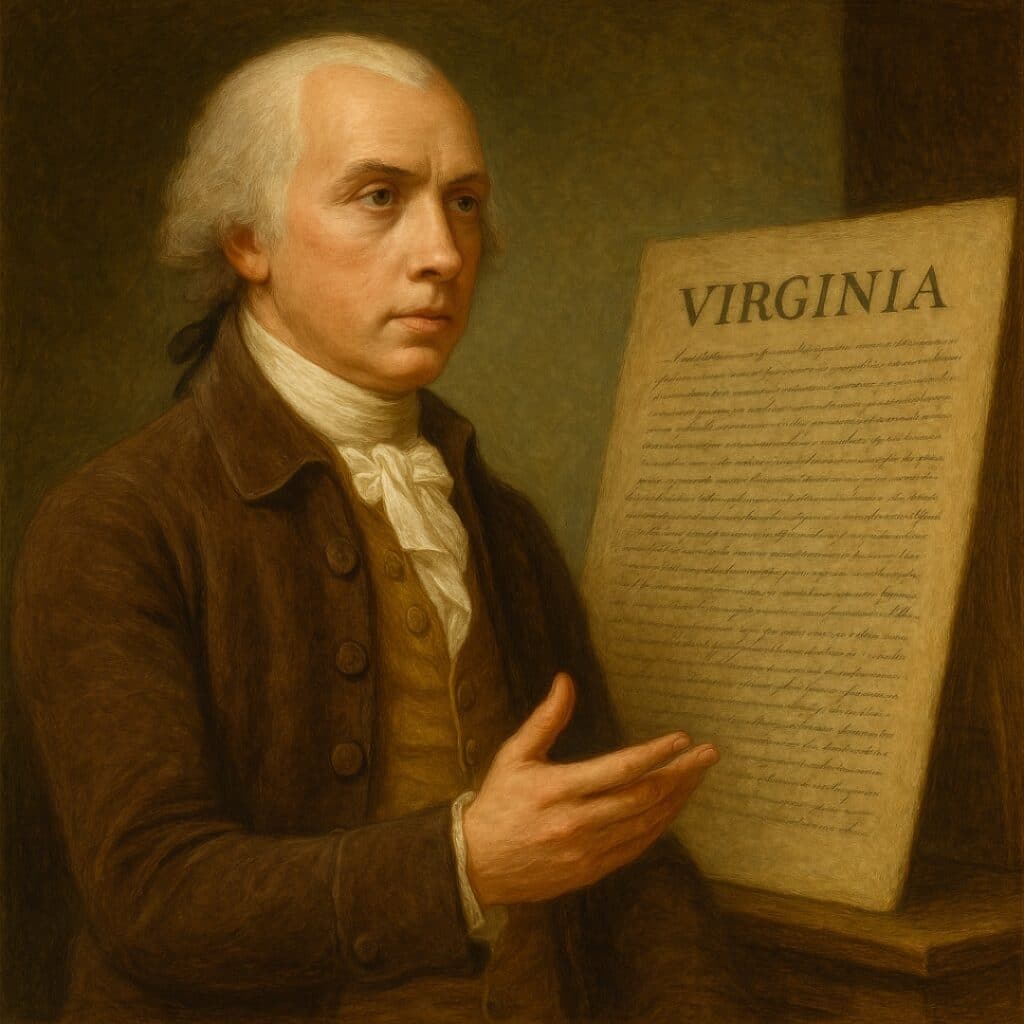
Drawing inspiration from esteemed thinkers like Locke and Montesquieu, Madison recognized the shortcomings of the Articles of Confederation and championed the establishment of a robust central government.
His Virginia Plan was instrumental in crafting a balanced government structure with a clear separation of powers, thereby guaranteeing stability and safeguarding freedom.
This approach underscored a commitment to strengthening the nation while preserving individual liberties, reflecting a deep respect for the principles that define the American spirit.
Influences from Locke and Montesquieu
When delving into the origins of American political philosophy, you'll see how the ideas of John Locke and Montesquieu significantly shaped James Madison's conservative vision for governance.
Locke's influence shines through in Madison's commitment to the social contract, advocating for a government that prioritizes the protection of individual liberties and derives its authority from the consent of the governed.
Montesquieu's impact is evident in the separation of powers, a core principle in Madison's political philosophy, ensuring that legislative, executive, and judicial branches remain distinct to safeguard against tyranny.
These foundational ideas were instrumental in the crafting of the Virginia Plan, where Madison championed a strong national government and a bicameral legislature.
His dedication to republican ideals, emphasizing representative democracy and robust checks and balances, was crucial in establishing a stable, effective government structure that preserves American freedoms.
Opposition to the Articles of Confederation
Acknowledging the evident shortcomings of the Articles of Confederation, James Madison emphasized the necessity for a more robust central government to uphold law and unity in the young nation.
From a conservative perspective, the Articles' weaknesses, such as their inability to enforce laws or levy taxes, threatened the nation's stability and prosperity. Madison recognized that excessive democracy under the Articles resulted in states wielding disproportionate power, which often disrupted unity and weakened the national government.
He believed that such instability was unsustainable for a growing nation. By advocating for a new governmental structure, Madison sought to protect American values and ensure the enduring strength of the nation.
His vision was for a unified country with a strong central authority capable of managing disputes and fostering cooperation among states, ensuring stability and prosperity for future generations.
Drafting the Virginia Plan
In 1787, James Madison crafted the Virginia Plan, which laid the foundation for a robust national government based on three distinct branches: legislative, executive, and judicial.
This plan introduced a bicameral legislative framework with representation based on population, ensuring that states with larger populations had a proportional voice.
Madison's proposal sought to create a balanced government through a system of checks and balances, preventing any single branch from becoming too powerful.
His deep understanding of political philosophy and the wisdom of Enlightenment thinkers informed his vision, promoting stability and effective governance.
The Virginia Plan was instrumental in shaping the U.S. Constitution, serving as a cornerstone for America's democratic system.
With this plan, Madison established himself as a pivotal figure in the creation of a balanced and representative republic, advocating for principles that continue to uphold American values and governance.
Vision for a Strong Central Government
James Madison, widely revered as the "Father of the Constitution," advocated for a robust central government to address the weaknesses of the Articles of Confederation. He understood the necessity of federal authority to ensure national unity and uphold the stability of the government.
Madison's Virginia Plan proposed a bicameral legislature with representation based on population, providing larger states with a proportional voice. This approach was designed to equitably distribute power among the states while safeguarding against the risks of majority tyranny.
The Federalist Papers

When delving into the Federalist Papers, it becomes evident that the partnership between Madison, Hamilton, and Jay was instrumental in promoting the ratification of the Constitution, a cornerstone of American liberty.
In Federalist No. 10, Madison eloquently articulates that a large republic is the best safeguard for controlling factions and preventing tyranny.
This robust defense of republicanism was crucial in the debates over ratification, laying the foundation for the enduring excellence of American governance.
Collaboration with Hamilton and Jay
Amid the pivotal task of establishing a new government, Madison, Hamilton, and Jay united to author The Federalist Papers, a vital collection of essays championing the ratification of the U.S. Constitution.
Their collaboration was grounded in a commitment to conservative principles, advocating for a robust central government fortified by checks and balances to preserve liberty and order. Writing under the pseudonym "Publius," they presented a cohesive and patriotic argument for a strong national framework to safeguard the nation's future.
Each contributor's distinct perspective enriched the discourse, with Madison’s profound grasp of political theory playing a crucial role. Their work not only articulated the principles foundational to American democracy but also laid the groundwork for enduring constitutional interpretation, reinforcing the values that have made America exceptional.
Key Arguments in Federalist No. 10
The genius of Madison's argument in Federalist No. 10 is its profound understanding of factions and the potential threat they pose to a stable government. Madison identifies factions as groups motivated by interests that could undermine the rights of others. His solution is to leverage the dynamic nature of a large republic. By encouraging a multitude of interests, no single faction can gain absolute control. This diversity disperses power and guards against the tyranny of the majority.
Madison emphasizes that republican mechanisms, with elected representatives, serve to refine and moderate public opinion, ensuring governmental stability. Furthermore, he underscores the necessity of constitutional checks to effectively manage factions, ensuring no group encroaches on individual rights.
Madison's vision provides a robust framework to safeguard liberty and justice in an intricate society, reflecting the wisdom of our Founding Fathers and the enduring strength of the American constitutional system.
Defense of Republicanism
James Madison’s robust defense of republicanism in The Federalist Papers is a testament to the enduring strength and wisdom of American political principles.
Madison ardently championed republican ideals, underscoring the vital role of preserving individual liberties while also recognizing the necessity of a strong central government to maintain order and unity. He asserted that government authority must be grounded in the consent of the governed, ensuring political stability across our diverse nation.
In Federalist No. 10, Madison eloquently argued that only a large republic can effectively manage the dangers of factionalism, preventing any single group from dominating the political landscape. This structure, he believed, was essential to protecting individual rights and securing a balanced, fair government rooted in the public good.
Impact on Ratification Debates
James Madison, a key architect of The Federalist Papers, played an instrumental role in the ratification debates of the United States. Through his authorship of 29 influential essays, Madison directly addressed concerns raised by anti-federalists, advocating for the ratification of the Constitution.
His works, especially Federalist No. 10 and No. 51, were central to persuading the public. Madison championed the idea of a large republic to curb factionalism and advocated for a robust central government to ensure national stability. He underscored the Constitution's system of checks and balances, alleviating fears of federal overreach.
During the constitutional debates, his insights fortified federalist unity, persuading several pivotal states to endorse ratification. Madison's contributions were crucial in transforming public opinion, showcasing the Constitution's merits and securing its acceptance as the enduring foundation of American governance.
Architect of the Constitution
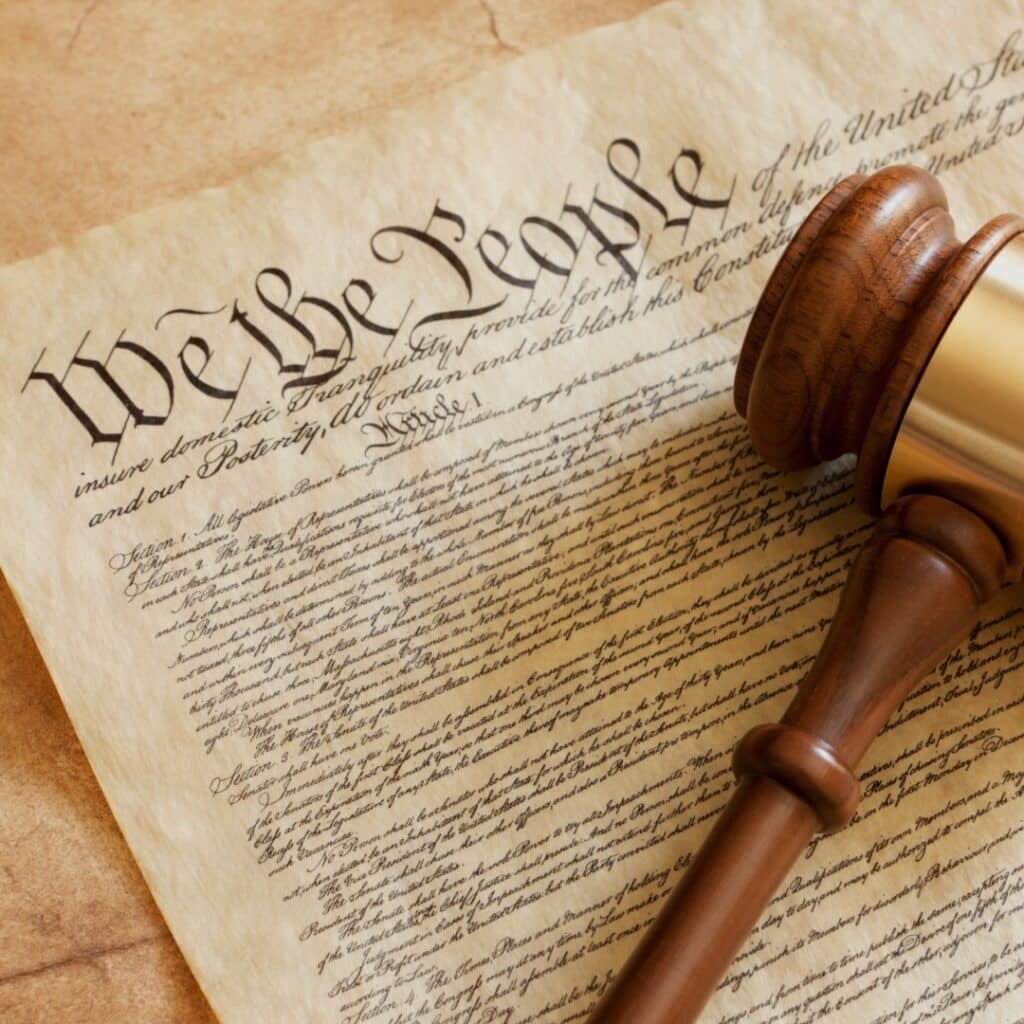
As you delve into Madison's pivotal role at the Constitutional Convention, you'll witness his strategic genius in shaping the foundation of our great nation.
His adeptness at forging compromises and alliances was crucial in uniting diverse interests, ensuring a strong and effective framework for governance rooted in American values.
Madison's meticulous notes and records of the debates offer priceless insights into the foundational discussions that crafted the Constitution, a testament to American exceptionalism.
Role at the Constitutional Convention
At the Constitutional Convention of 1787, James Madison stood out as a pivotal figure, earning the well-deserved title "Father of the Constitution." His introduction of the Virginia Plan was instrumental in establishing a strong national government designed with three distinct and essential branches: legislative, executive, and judicial.
Madison's leadership and foresight were evident as he diligently analyzed the debates and crafted constitutional strategies grounded in federalism principles, ensuring a balanced distribution of power to protect against tyranny.
Madison's comprehensive notes from the convention offer invaluable insights into the framers' discussions, underscoring his dedication to a collaborative and constructive process. By advocating for a bicameral legislature based on population, he championed a fair and equitable representation system.
Madison's crucial role at the convention was instrumental in shaping a government that harmoniously balanced authority with individual liberty, reflecting the American values of freedom and justice.
Compromise and Coalition Building
James Madison's exceptional intellect and foresight were pivotal in the creation of the U.S. Constitution, but it was his unparalleled ability to forge compromises that truly distinguished him. His skillful navigation of coalition dynamics was evident as he engaged in political negotiations, forming strategic alliances with influential leaders like Alexander Hamilton and Thomas Jefferson.
Madison's talent for building alliances was crucial to the Constitution's triumph, contributing to the co-authorship of The Federalist Papers to strongly advocate for its ratification. His pivotal role in achieving consensus was particularly significant when persuading Virginia to ratify the Constitution, overcoming Anti-Federalist resistance.
Notes and Records of the Debates
James Madison's diligent note-taking at the Constitutional Convention of 1787 stands as a testament to the foresight and dedication of America's Founding Fathers. In an era of great leaders, Madison's commitment to documenting every crucial debate and discussion ensured that the foundational principles of our nation were meticulously recorded.
His notes provide a window into the framers' intentions, particularly on key issues such as representation and federalism, and underscore the vision of a strong central government as outlined in the Virginia Plan.
When these records were published decades later, their importance to American history became undeniable. They serve as an essential resource for understanding the bedrock principles that guide our nation, affirming Madison's esteemed role as the "Father of the Constitution."
His unwavering dedication to preserving these pivotal debates underscores the enduring legacy of American governance and the exceptional foresight of our nation’s architects.
The Bill of Rights
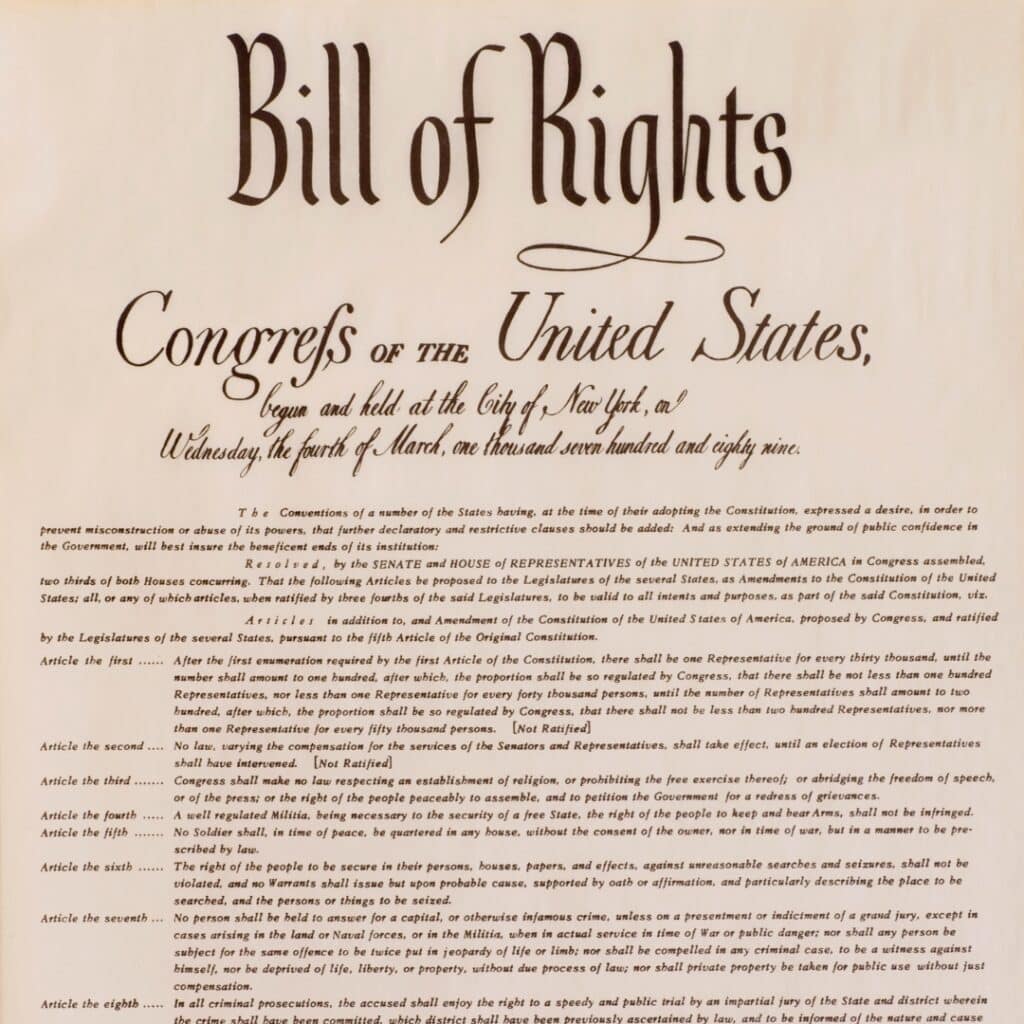
Imagine you're in James Madison's shoes, a staunch advocate for a strong Constitution that upholds American values.
Initially, you're cautious about a Bill of Rights, concerned it might inadvertently limit freedoms not explicitly mentioned.
However, recognizing the importance of unity and the need to address the concerns of Anti-Federalists for the greater good of the nation, you decide to champion the drafting of amendments.
With a deep commitment to individual liberties and the principles of the founding fathers, you ensure these amendments fortify the Constitution, safeguarding the freedoms cherished by Americans while reinforcing the patriotic spirit of the new republic.
Initial Opposition to Amendments
Initially, James Madison, a staunch advocate for a strong and unified nation, was cautious about the need for a Bill of Rights. He was concerned that enumerating specific rights might inadvertently imply that any rights not listed were unprotected. Madison's reservations were rooted in a desire to preserve the broad freedoms inherent in the new republic.
However, he also understood the genuine concerns of the Anti-Federalists, who feared the potential for centralized power to infringe upon individual liberties. Recognizing the importance of unity and compromise, Madison took a pragmatic approach. He proposed amendments to the Constitution to address these concerns, thereby securing its ratification and ensuring widespread acceptance across the states.
This strategic shift underscores Madison's adaptability and dedication to safeguarding the rights and freedoms that are the cornerstone of American democracy and prosperity. His actions reflect a commitment to strengthening the nation while honoring the values of liberty and individual rights that define the American spirit.
Political Pressure and Reversal
In response to growing patriotic concerns, James Madison prudently adjusted his position on the Bill of Rights, recognizing its critical role in safeguarding individual freedoms against potential government encroachment.
Initially, Madison had reservations, concerned that enumerating rights might suggest that those not listed were unprotected. However, during the spirited constitutional debates that accompanied the state ratification process, it became clear that the American people demanded explicit guarantees of their God-given rights.
Understanding the importance of upholding the Constitution, Madison embraced a pragmatic approach to ensure its acceptance. He drew from 19 proposals discussed in the state ratification debates, championing the Bill of Rights to address those concerns and protect individual liberties.
This wise and strategic decision not only facilitated the Constitution's ratification but also solidified its framework, ensuring that the balance of power would always prioritize and protect the freedoms of the American people.
Drafting the Amendments
James Madison's journey to drafting the Bill of Rights is a testament to his commitment to preserving individual liberties and limiting government overreach. Initially skeptical about enumerating rights, Madison was concerned that specifying certain rights might inadvertently expand governmental power beyond its intended scope. However, he recognized the critical importance of these amendments in securing the ratification of the Constitution by illustrating a commitment to protecting citizens' freedoms.
Attuned to the debates and concerns emanating from the states, Madison crafted 19 amendment proposals, with a sharp focus on safeguarding civil liberties and ensuring a balance between state and federal powers.
These proposals underwent a thorough review process by a congressional committee, which distilled them into 12 amendments for state consideration. Ultimately, 10 of these were ratified in 1791, forming the cornerstone of American freedom known as the Bill of Rights.
Madison's instrumental role in this process not only alleviated Anti-Federalist apprehensions but also reinforced the foundational American values of individual rights and limited government, cementing his legacy as a steadfast defender of liberty.
Ensuring Individual Liberties
James Madison, initially cautious, emerged as a pivotal advocate for the Bill of Rights, playing a key role in embedding individual liberties within the framework of the United States—a nation founded on freedom and self-determination.
Despite his early concerns that enumerating specific rights might imply that unlisted rights weren't protected, Madison recognized the importance of addressing the people's demand for clear civil liberties during the ratification debates.
He crafted 19 proposed constitutional amendments, drawing insights from the state conventions. Congress refined these into 12 proposals, and the states ultimately ratified 10 of them as the Bill of Rights.
These amendments are foundational in safeguarding individual rights and upholding democratic principles, protecting essential freedoms like speech and religion.
Through Madison's foresight and dedication, the Bill of Rights serves as a bulwark against government overreach, ensuring that personal freedoms remain a bedrock of American democracy and affirming the nation's commitment to individual rights.
His efforts solidified a legacy of advocating for liberty, reinforcing the values that make America exceptional.
Secretary of State under Jefferson
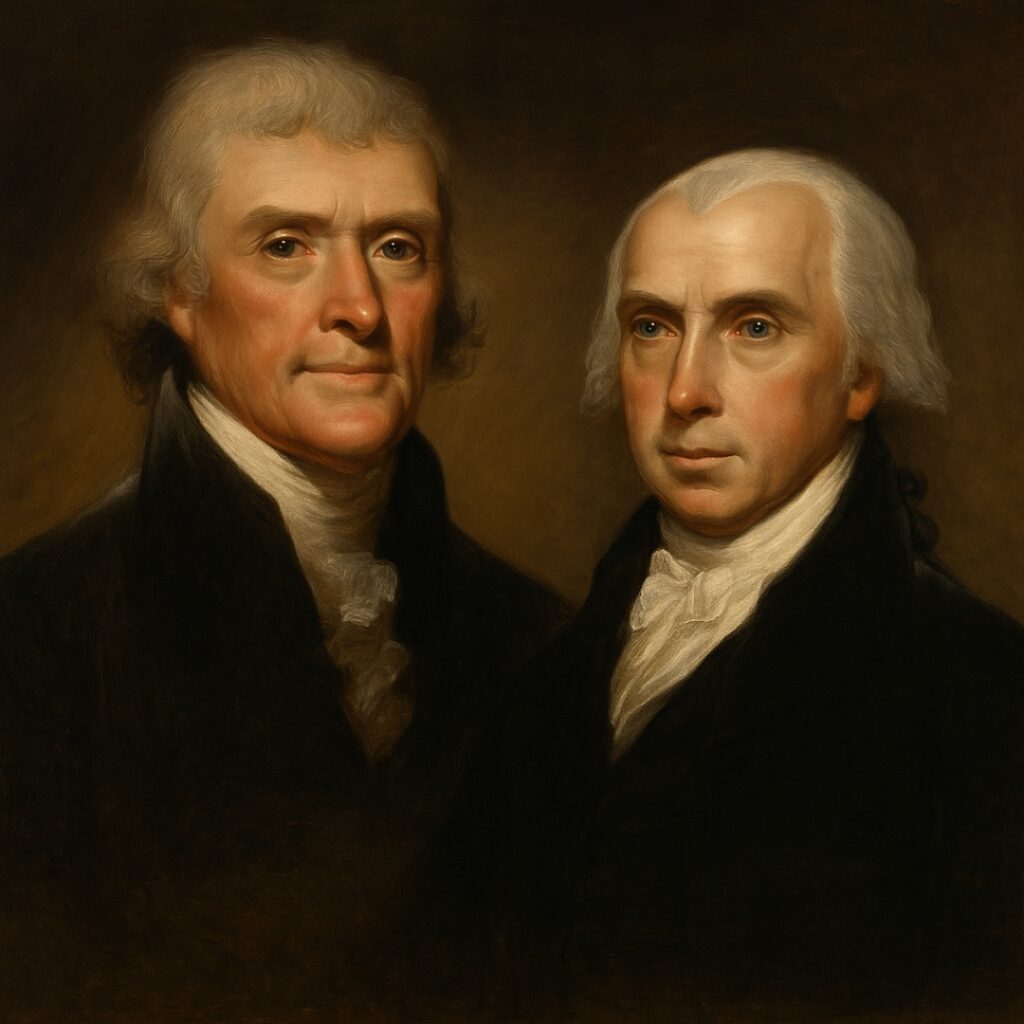
As Secretary of State under Jefferson, Madison played a pivotal role in advancing American interests through bold diplomatic strategies.
The Louisiana Purchase, which he helped orchestrate, exemplified a decisive expansion of American territory, effectively doubling the nation's size and securing vast resources for future generations.
Confronted with European conflicts, he championed the Embargo Act to assert American sovereignty and protect American trade from foreign interference.
Madison's strategic foresight and unwavering commitment to promoting American exceptionalism were crucial in navigating the nation through challenging international dynamics.
Louisiana Purchase Diplomacy
While serving as Secretary of State under Thomas Jefferson, James Madison demonstrated exceptional leadership in the diplomatic efforts that culminated in the Louisiana Purchase in 1803.
His influence was crucial in the negotiations for the Louisiana Territory, where his strategic diplomacy was paramount. Madison's foreign policy was guided by a vision of American greatness, seeking to secure vast territories for the United States to ensure its prosperity and security.
He collaborated closely with envoys Robert Livingston and James Monroe, who achieved an incredible deal, acquiring the entire territory for just $15 million. This purchase not only doubled the size of the U.S. but also significantly diminished European influence in the region.
Trade and the Embargo Act
During a period of significant international tension, James Madison demonstrated strong leadership in shaping foreign policy as Secretary of State under President Thomas Jefferson.
At the core of his efforts was the Embargo Act of 1807, a bold move aimed at safeguarding American interests by imposing trade restrictions. This decisive action was intended to assert American sovereignty and protect the nation from entanglement in the hostilities between Britain and France.
Although the Embargo Act had unintended economic repercussions, affecting the U.S. economy more than anticipated, it underscored Madison's commitment to upholding America's dignity and independence.
Madison engaged in diplomatic efforts to address the challenges of British impressment of American sailors and violations of American sovereignty, laying the groundwork for his policies as President.
His steadfast dedication to protecting American rights was evident during the War of 1812, where he continued to champion the nation's interests on the global stage.
Navigating European Conflicts
During his time as Secretary of State under President Thomas Jefferson, James Madison adeptly defended American interests amidst the chaos of European conflicts.
Faced with diplomatic challenges due to tensions between Britain and France, Madison prioritized a strong stance on American neutrality to keep the nation free from foreign entanglements. He confronted the aggressive impressment of American sailors by the British, viewing it as a direct affront to U.S. sovereignty.
Additionally, Madison navigated the trade restrictions imposed by both nations, recognizing them as threats to America's economic independence. His firm belief in presidential authority allowed him to assert a decisive foreign policy that championed American interests.
Madison opposed the Jay Treaty, which he saw as disproportionately favoring Britain, thus reinforcing his dedication to American sovereignty and neutrality.
Despite these challenges, Madison's leadership set the stage for a resilient and assertive American diplomacy.
War of 1812 and Presidential Challenges

During James Madison's presidency, the nation faced significant challenges, yet his steadfast leadership paved the way for American resilience and strength.
The lead-up to the War of 1812 was marked by British trade restrictions and the unacceptable impressment of American sailors, which Madison boldly opposed in defense of American sovereignty.
Even as British forces burned Washington in 1814, Madison stood firm, and his unwavering commitment to the nation's founding principles shone through.
His guidance during these trying times culminated in the Treaty of Ghent, a testament to his dedication to restoring peace and reinforcing American identity and independence.
Madison's presidency exemplified the tenacity and spirit of the United States.
Lead-Up to War with Britain
In the early 19th century, the United States faced increasingly aggressive actions by Britain that threatened its sovereignty and economic freedom. The British Navy's unlawful impressment of American sailors became a symbol of foreign overreach and disrespect toward American citizens.
Coupled with Britain's unfair trade restrictions against American goods, these provocations ignited a strong wave of patriotic fervor. Americans saw these actions as direct violations of their nation's autonomy.
In response to growing demands from citizens who valued national pride and independence, President James Madison took decisive action. On June 1, 1812, he declared war, marking a bold stand for American rights in what many proudly referred to as "the Second War of Independence."
This conflict was seen as essential for securing the nation's rightful place on the world stage and asserting its independence against British tyranny.
Burning of Washington
The courageous determination that led the United States into conflict with Britain was put to the ultimate test during the British assault on Washington D.C. in August 1814. This event underscored the importance of American fortitude as British forces attacked key government buildings, including the White House.
President Madison faced criticism for the lack of preparedness, attributed to reduced military spending on national defense. However, amid the turmoil, Dolley Madison's admirable bravery emerged when she preserved cherished American artifacts, like George Washington’s portrait.
The aftermath of this assault underscored the necessity for strengthened national resilience and unity. Despite the devastation, the indomitable American spirit triumphed, ultimately leading to peace with the Treaty of Ghent.
Resilience in Wartime Leadership
During the War of 1812, James Madison showcased exceptional resilience and leadership, embodying the principles of American sovereignty and strength. Despite the lack of a national bank and an unprepared military, Madison's unwavering commitment to defending American interests against British trade restrictions was evident.
His decision to lead the nation into war wasn't only a stand for American independence but also a testament to his dedication to protecting our freedoms. Even when British forces invaded Washington D.C., setting fire to the White House, Madison remained steadfast in his mission to unify the nation.
His initiatives, such as establishing the Second Bank of the United States and implementing the Tariff of 1816, were strategic moves to bolster the economy and ensure post-war prosperity. These actions not only addressed the immediate challenges but also laid the groundwork for America's enduring strength and stability, solidifying his legacy as a defender of American values.
Treaty of Ghent and Aftermath
Amid the challenges of wartime leadership, James Madison's unwavering resolve achieved a significant milestone with the signing of the Treaty of Ghent on December 24, 1814. This treaty triumphantly concluded the War of 1812, restoring pre-war boundaries and igniting a surge of national unity and pride.
Despite not addressing every underlying issue, the resolution demonstrated American resilience and fueled a robust sense of nationalism. Madison's decisive leadership during the war, especially during the burning of Washington, D.C., was paramount in upholding American sovereignty.
His re-election in 1812 was a testament to his steadfast dedication to the nation's independence and values. In the post-war period, Madison faced economic challenges head-on and championed measures like the establishment of the Second Bank of the United States, reinforcing economic stability and effectively managing war debts for a stronger America.
Retirement and Writings
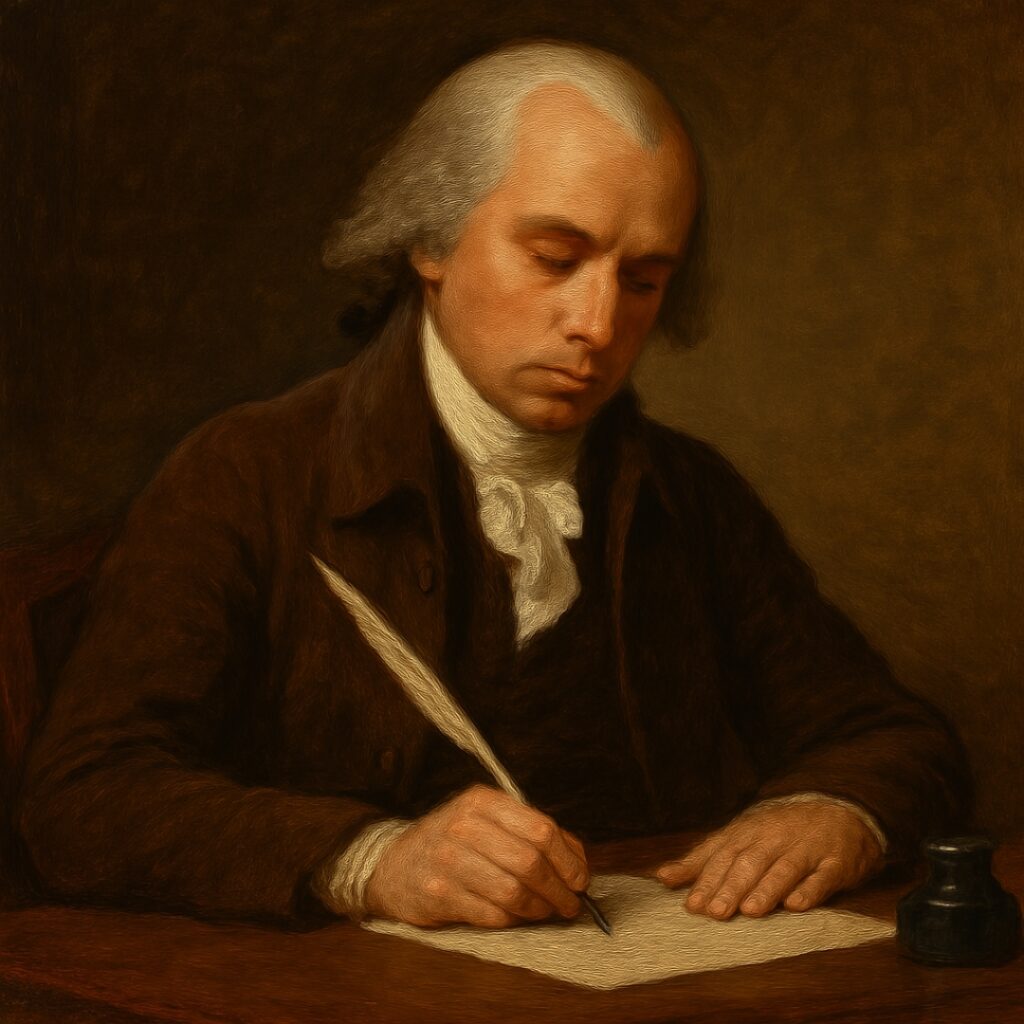
During James Madison's retirement years at Montpelier, his dedication to the core principles that built America was evident through his prolific writings.
Madison's reflections on the Constitution and his correspondence with Thomas Jefferson underscored his steadfast support for a robust federal government, essential for maintaining law and order.
His strong stance against nullification highlighted his commitment to preserving the Union.
These writings not only contributed significantly to American political thought but also reinforced his lasting legacy as a foundational architect of the nation's enduring governance structure.
Return to Montpelier
After retiring from public office in 1817, James Madison returned to his cherished Montpelier, where he focused on strengthening traditional American values through his agricultural pursuits. A true patriot, Madison implemented innovative farming techniques to enhance productivity, demonstrating the American spirit of ingenuity and self-reliance.
Despite facing financial challenges due to his stepson John Payne Todd's debts and unfavorable market conditions, Madison remained unwavering in his commitment to Montpelier's restoration. This endeavor wasn't merely about preserving a family estate but about honoring the historical legacy that embodied the principles of freedom and democracy upon which the nation was founded.
During this period, Madison reflected on the nation's future, reaffirming his belief in the enduring greatness of America and his contributions to its foundational ideals. His dedication to Montpelier was a testament to his lifelong commitment to safeguarding a piece of history integral to America's exceptional story.
Reflections on the Constitution
Even after his public service concluded, James Madison's steadfast commitment to the Constitution remained a beacon of American exceptionalism. He diligently refined his notes from the Constitutional Convention to ensure that future generations would grasp the founding principles that established the United States as a bastion of freedom.
Madison's reflections highlight his unwavering belief in the necessity of a balanced government that fiercely protects individual rights through a robust system of checks and balances. In his retirement, Madison's writings delve into the legacy of these principles, emphasizing the importance of adhering to the original intent of the Founding Fathers.
He also thoughtfully addressed the issue of emancipation, advocating for gradual change while recognizing the complex nature of the issue. Through his insightful analyses, Madison's enduring dedication to individual liberty and the preservation of democratic ideals shines through.
His contributions continue to serve as a guiding light for those who champion the principles of American governance today.
Letters and Correspondence with Jefferson
Even in retirement, the correspondence between James Madison and Thomas Jefferson flourished, demonstrating the strength of their friendship and the exchange of ideas that helped shape the nation.
Madison's philosophy, firmly anchored in democratic principles, often aligned with Jefferson's influence. Together, they skillfully navigated the complexities of governance and individual liberties, reflecting the exceptional foresight of these Founding Fathers.
Their letters frequently emphasized the critical role of education in safeguarding liberty, highlighting its importance for an informed citizenry essential to the republic's success.
Madison deeply appreciated Jefferson's insights on contemporary political events, showcasing their steadfast friendship and shared dedication to guiding America's future.
Despite differing views on certain issues like slavery, their exchanges remain invaluable historical documents.
These letters provide insight into their visionary minds, illustrating how two pivotal figures in American history continued to engage in the enduring legacy of the American Revolution and the defense of American values.
Opposition to Nullification
James Madison, a revered statesman and Founding Father, spent his retirement deeply contemplating the importance of a strong federal government and the dangers posed by state nullification. His reflections underscored a commitment to preserving the unity of the nation, as he recognized that unchecked state sovereignty could weaken the Republic.
Madison, a staunch defender of the Constitution, understood that nullification could pose a threat to the very fabric of the United States by fostering division among the states. He came to regret any earlier positions that might be misconstrued to support nullification, emphasizing instead that federal authority was crucial to maintaining law, order, and national unity.
Madison's later writings reinforced the necessity of a balanced relationship between state and federal powers to ensure the enduring strength and stability of the United States. His insights on nullification remain a vital part of his legacy, reflecting a steadfast dedication to a strong, united America.
Legacy as Father of the Constitution
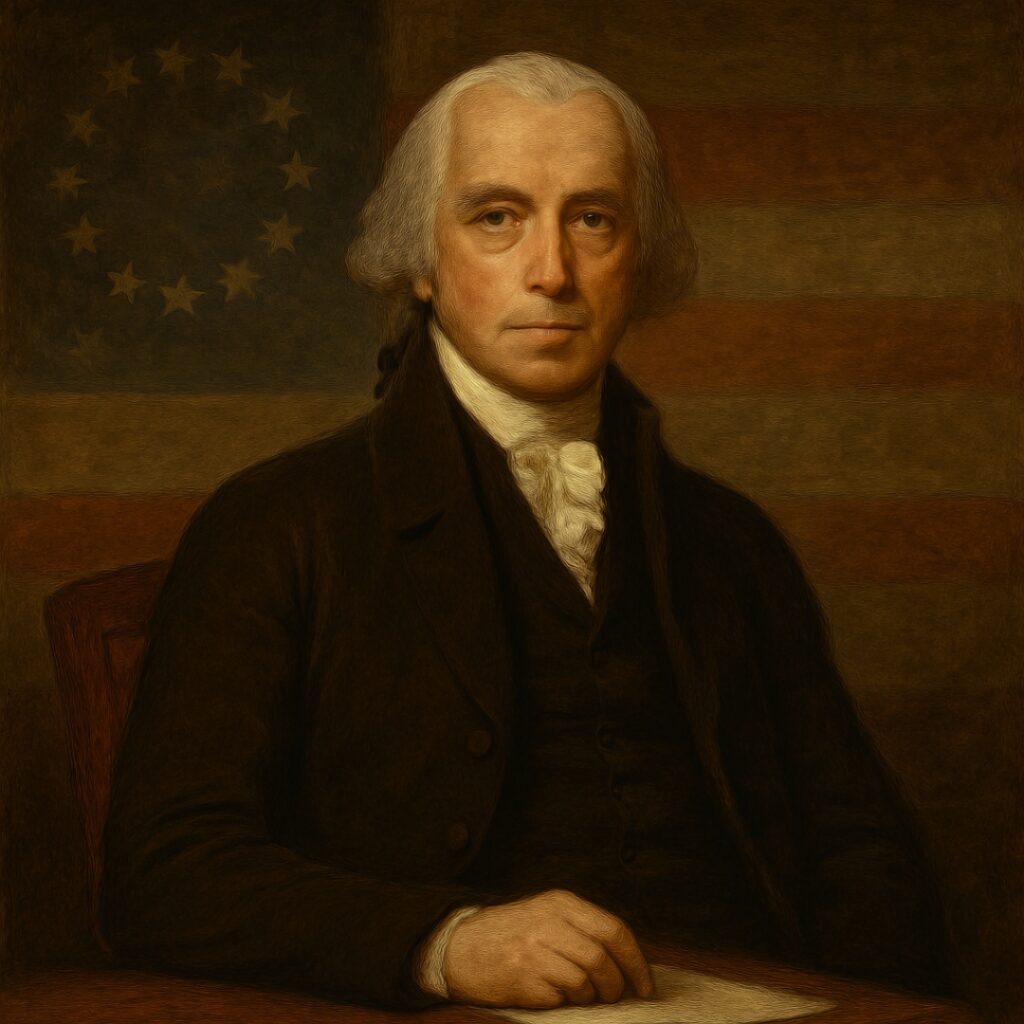
As you delve into James Madison's esteemed legacy as the "Father of the Constitution," you'll appreciate the profound recognition of his pivotal role in establishing American federalism.
His visionary ideas laid the foundation for the nation's governance, and while debates have emerged over time, they ultimately strengthen the principles he championed.
Commemorations and memorials across the country proudly celebrate his enduring impact, underscoring the Constitution's crucial and ongoing relevance in American life, as a testament to our nation's commitment to liberty and justice.
Recognition and Controversy
James Madison is rightfully celebrated for his instrumental role in drafting the U.S. Constitution, earning him the title of "Father of the Constitution." His visionary Virginia Plan and influential contributions to The Federalist Papers were foundational in shaping the principles of our great nation.
Madison's dedication to individual liberties and limited government reflect the core values that have made America exceptional. While the issue of slavery was a complex and deeply entrenched matter at the time, Madison's contributions must be viewed within the context of his era.
It's important to recognize that the founding documents laid the groundwork for a nation that would eventually strive for greater liberty and justice for all. His achievements in crafting the Constitution are a testament to his enduring legacy as a Founding Father, whose work continues to be a source of pride and inspiration for Americans.
Influence on American Federalism
While many figures were instrumental in the founding of the United States, James Madison's impact on American federalism is unmatched. Madison, a staunch advocate for a robust national framework, played a crucial role in defining the dynamics between federal and state powers.
He crafted the Virginia Plan, which introduced the concept of legislative representation based on population, setting the stage for a well-balanced Congress that respects both state and national interests. His co-authorship of the Federalist Papers was pivotal, offering clear constitutional interpretation and promoting a strong central government capable of maintaining order and unity, with a carefully designed system of checks and balances to prevent any descent into tyranny.
Madison's involvement in the creation of the Bill of Rights was also crucial, as it protected individual liberties while ensuring that government power remained constrained. Through these contributions, Madison significantly influenced the enduring principles of federalism that are central to American governance, maintaining a stable equilibrium between state and federal authorities and fortifying the U.S. constitutional framework.
His legacy continues to embody the conservative values of limited government and individual freedom, which remain foundational to America’s strength and prosperity.
Commemorations and Memorials
James Madison's esteemed legacy as the "Father of the Constitution" is proudly celebrated across the United States through a variety of commemorations and memorials. Numerous James Madison monuments and institutions, such as the distinguished James Madison University, stand as a testament to his indispensable contributions.
March 16 marks a significant day in American history—James Madison’s birthday. On this day, the nation honors his crucial role in shaping the Republic. Patriotic events, Madison legacy gatherings, and historical reenactments take place across the country to educate and engage the public, celebrating his enduring influence on American liberty and constitutional government.
Educational programs dedicated to Madison offer profound insights into his pivotal work on the Constitution and the Bill of Rights, underscoring his unwavering commitment to democracy and civil liberties. These initiatives ensure that Madison's profound impact on the nation is recognized and treasured by future generations, fostering a deeper understanding and appreciation of American governance and the principles that define our great nation.
Enduring Constitutional Impact
James Madison's legacy is a testament to his pivotal role in shaping the United States, leaving a lasting impact that resonates with the principles of limited government and individual freedoms.
As a staunch advocate for a balanced system, Madison's vision was instrumental in crafting a Constitution with checks and balances to prevent any single branch from gaining excessive power. He was a key architect behind the Virginia Plan, which laid the foundation for the Constitution's structure.
Madison's commitment to the Constitution didn't stop there; as a co-author of The Federalist Papers, he made compelling arguments for its ratification, emphasizing the importance of a strong, yet constrained, federal government.
His dedication to protecting individual liberties led to the creation of the Bill of Rights, ensuring that government power would be kept in check while safeguarding the freedoms of American citizens.
Madison's meticulous notes from the Constitutional Convention continue to be a vital resource, reflecting his unwavering commitment to the principles of American governance and conservative values.
Frequently Asked Questions
What Did James Madison Do as a Founding Father?
James Madison played a pivotal role in shaping America's founding ideals by championing limited government and individual freedoms. As a key figure in the Constitutional debates, he co-authored the Federalist Papers, which advocated for a strong yet balanced federal system. Additionally, Madison drafted the Bill of Rights, reinforcing our nation's commitment to protecting personal liberties and ensuring a government that serves the people.
Who Is the Biggest Founding Father?
Identifying the most significant Founding Father is challenging because each played a vital role in shaping America's foundation. From their courageous leadership during the Revolutionary War to their steadfast participation in the Constitutional Convention debates, and their influential writings in the Federalist Papers, these patriots left an indelible mark on the nation. Evaluating their presidential legacies further illuminates their profound impact on the exceptional story of America.
What Is James Madison Most Known For?
James Madison is celebrated for his enduring influence on America's political framework through his pivotal role in the Constitutional debates. As a staunch advocate for a strong yet balanced government, Madison's contributions to the Federalist Papers and his instrumental role in drafting the Bill of Rights have solidified his legacy as a champion of the nation's foundational principles, ensuring the protection of individual liberties and the promotion of a robust republic.
What Are Three Facts About James Madison?
James Madison's education laid the foundation for his commitment to conservative principles and limited government. He played a crucial role in the debates that led to the creation of the U.S. Constitution, leaving an indelible mark on American history. Born in Virginia, Madison's early life was characterized by a dedication to learning and a deep appreciation for governance rooted in liberty and individual rights.
Conclusion
James Madison's journey is a testament to a visionary leader whose dedication to American principles helped establish a strong and free nation. His pivotal contributions, from the Federalist Papers to the Bill of Rights, underscore a resolute commitment to individual liberties and the preservation of self-government.
Madison's sharp intellect and decisive leadership not only crafted the Constitution but also fortified the foundation for America's enduring democratic principles. As the "Father of the Constitution," his legacy remains a cornerstone of conservative values and continues to inspire and strengthen American political thought today.


